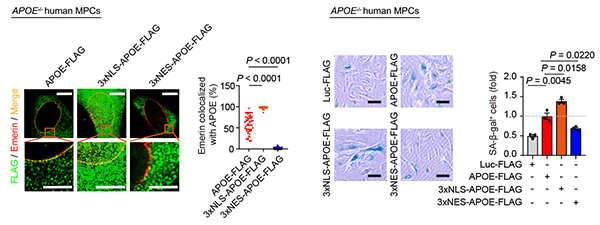
Prof. Liu Guanghui and his colleagues from the Institute of Zoology and the Beijing Institute of Genomics of the Chinese Academy of Sciences have collaborated to find that Apolipoprotein E (APOE) destabilizes heterochromatin and drives senescence in human stem cells. Results were published in Nature Aging on March 28.
APOE is well known as a classical lipid-transport protein that mediates lipid transport. Despite accumulating evidence showing that it is closely implicated in Alzheimer’s disease, atherosclerosis, and human longevity, the role of APOE in the regulation of aging is largely unknown.
In this study, the researchers found that the expression of APOE protein increased in aging human stem cells and that human stem cell senescence was accelerated upon APOE overexpression and attenuated by APOE knockout.
Mechanistically, they revealed that nuclear-localized APOE interacted with the nuclear envelope and heterochromatin-associated proteins to promote their degradation via the autophagy-lysosomal pathway, thus facilitating heterochromatin destabilization and contributing to human stem cell senescence.
In addition, they also discovered that knockdown of APOE delayed cellular senescence in multiple human cell models.
Source: Read Full Article
